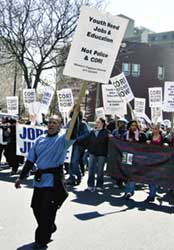Workers demand jobs and CORI reforms
By
Gerry Scoppettuolo
Boston
Published Apr 28, 2007 5:51 PM
A thousand mostly African-American and Latin@ workers marched on the
Massachusetts Statehouse on April 19 demanding jobs and Criminal Offender
Records Information (CORI) reform. Though the action started at 10 a.m. on a
weekday, busloads of people from Springfield and Worcester, Mass., joined
unemployed rank-and-file workers from Boston’s neighborhoods. The
militant march shut down major streets in the downtown area, defying repeated
police attempts to move it onto the sidewalk, as it traversed the miles from
Malcolm X Boulevard in Roxbury to the Boston Common.
|
Boston Workers Alliance
takes to the streets.
WW photo: Maureen Skehan
|
CORI laws give employers access to job applicants’ criminal records and
job dismissals dating back decades. These laws are designed to make it hard or
impossible for workers to get a job, any job, keeping many workers in a
permanent status of unemployment. Due to the racist nature of the court system,
CORI laws hurt people of color the most and are part of a general assault on
all working people. CORI acts the same way as the “pass laws” did
in apartheid South Africa: a permanent and official bar to good jobs and
hopeful futures.
Landlords also have unfettered access to CORI, resulting in the permanent
homelessness of growing ranks of people forced through the criminal injustice
system. Throughout the state, it is common that entire families are
collectively punished with eviction from public housing due to the alleged
“crime” of a young family member. Since the beginning of the era of
“homeland security,” employed workers are increasingly losing their
jobs and their housing when government agencies, acting with extra-judicial
powers under the boss’s notion of “guilty until proven
innocent,” take away professional licenses and work permits due to mere
allegations and unprocessed arrests.
The April 19 march was organized by the Boston Workers Alliance, a blossoming
organization of Boston City Councilor Chuck Turner’s District 7
Roundtable. Security and police liaison was commanded by Bishop Felipe
Teixeira, with support from “Team Unity” Boston City Councilors
Felix Arroyo, Sam Yoon and Charles Yancey, Cambridge Mayor Ken Reeves, and
Ex-Prisoners and Prisoners Organizing for Community Advancement (EPOCA).
Fielding solidarity contingents were the Women’s Lunch Place, the Union
of Minority Neighborhoods, the International Action Center, the Rosa Parks
Human Rights Day Committee, the Jericho Movement, Community Change Inc.,
Project Hip Hop, and the Boston School Bus Drivers Union, which drove a sound
truck. Student groups from Worcester Polytechnic Institute, Boston College,
Roxbury Community College and Harvard College also joined the line.
According to Boston Workers’ Alliance, “For entry-level applicants,
Black people with criminal records have a 5-percent chance of being called back
for interviews. Black people without records have a 14-percent chance. Whites
with records have 17-percent chance, and whites without records have 34-percent
chance.” (BWA CORI fact sheet) In fact, a person’s race is one of
the first things that is placed in the CORI criminal record. CORI is therefore
a green light to employers and landlords to engage in racial profiling. It
marks someone for inferior treatment based on nothing but a profile and a
history.
Following a rally at the Boston Common, hundreds of marchers occupied the
Massachusetts Statehouse for many hours, pressing their demands on legislators
and the new governor, whose campaign promises included CORI reform. The
protestors vowed to keep up the struggle, and many spoke of returning next week
to join the May Day/Great American Boycott rallies and marches for immigrant
rights.
Articles copyright 1995-2012 Workers World.
Verbatim copying and distribution of this entire article is permitted in any medium without royalty provided this notice is preserved.
Workers World, 55 W. 17 St., NY, NY 10011
Email:
[email protected]
Subscribe
[email protected]
Support independent news
DONATE


